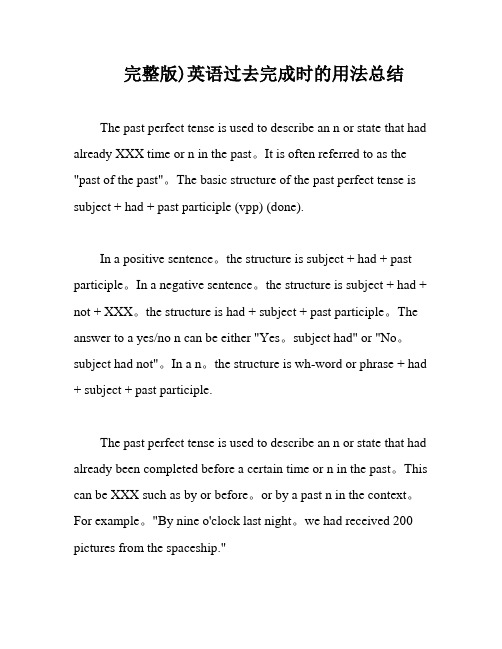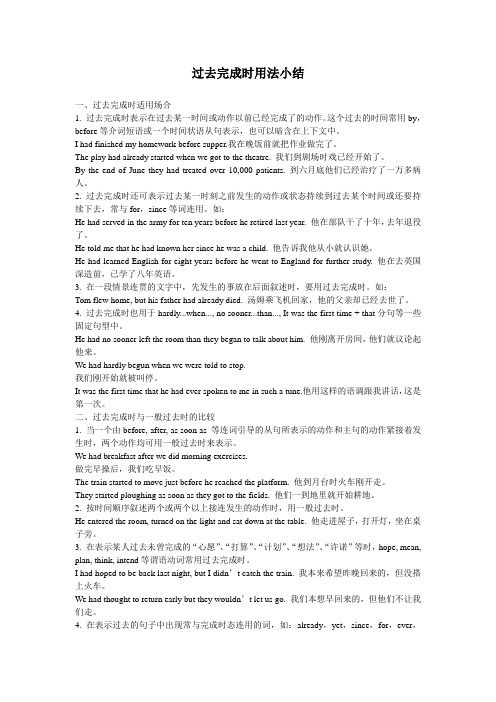过去完成时用法小结
完整版)英语过去完成时的用法总结

完整版)英语过去完成时的用法总结The past perfect tense is used to describe an n or state that had already XXX time or n in the past。
It is often referred to as the "past of the past"。
The basic structure of the past perfect tense is subject + had + past participle (vpp) (done).In a positive sentence。
the structure is subject + had + past participle。
In a negative sentence。
the structure is subject + had + not + XXX。
the structure is had + subject + past participle。
The answer to a yes/no n can be either "Yes。
subject had" or "No。
subject had not"。
In a n。
the structure is wh-word or phrase + had + subject + past participle.The past perfect tense is used to describe an n or state that had already been completed before a certain time or n in the past。
This can be XXX such as by or before。
or by a past n in the context。
过去完成时用法小结

过去完成时用法小结一、过去完成时适用场合1. 过去完成时表示在过去某一时间或动作以前已经完成了的动作。
这个过去的时间常用by,before等介词短语或一个时间状语从句表示,也可以暗含在上下文中。
I had finished my homework before supper.我在晚饭前就把作业做完了。
The play had already started when we got to the theatre. 我们到剧场时戏已经开始了。
By the end of June they had treated over 10,000 patients. 到六月底他们已经治疗了一万多病人。
2. 过去完成时还可表示过去某一时刻之前发生的动作或状态持续到过去某个时间或还要持续下去,常与for,since等词连用。
如:He had served in the army for ten years before he retired last year. 他在部队干了十年,去年退役了。
He told me that he had known her since he was a child. 他告诉我他从小就认识她。
He had learned English for eight years before he went to England for further study. 他在去英国深造前,已学了八年英语。
3. 在一段情景连贯的文字中,先发生的事放在后面叙述时,要用过去完成时。
如:Tom flew home, but his father had already died. 汤姆乘飞机回家,他的父亲却已经去世了。
4. 过去完成时也用于hardly...when..., no sooner...than..., It was the first time + that分句等一些固定句型中。
He had no sooner left the room than they began to talk about him. 他刚离开房间,他们就议论起他来。
过去完成时态的结构与用法

过去完成时态的结构与用法一、过去完成时态的基本结构过去完成时态是英语中的一种时态,用于表达在过去某个时间之前已经完成的动作或状态。
它通常由had以及动词的过去分词构成。
下面是过去完成时态的基本结构:肯定句:主语 + had + 过去分词例如:- I had finished my homework before dinner.- They had traveled to Europe by the end of last year.否定句:主语+ hadn’t + 过去分词例如:- He hadn't studied for the exam when the teacher announced it.疑问句:Had + 主语 + 过去分词?例如:- Had you seen that movie before yesterday?二、过去完成时态的用法1. 表示在过去某时间之前已经发生或完成的动作或状态。
例如:- She had already left when I arrived at the party.2. 用于时间状语从句中,引导过去某个时间之前已经完成的动作或状态。
例如:- Before he came to the office, I had already finished the report.3. 用于叙述过去发生的事情时,可以使用过去完成时来表达先后关系。
例如:- The team had won several matches before they lost the final game.4. 过去完成时态常与过去简单时态连用,用于描述先后发生的两个过去动作或状态。
例如:- I had read the book before I watched the movie.三、对过去完成时态的理解和观点过去完成时态在英语写作中扮演着重要的角色,它帮助我们清晰地表达过去事件的先后顺序,同时也可以突出某个动作或状态在过去某个特定时间之前已经完成。
过去完成时的用法与常见句型

过去完成时的用法与常见句型过去完成时是英语中一种表示在过去某个时间点或动作之前已经完成的动作或状态的时态。
它可以帮助我们更准确地描述过去的时间关系和事件顺序。
本文将介绍过去完成时的用法和常见句型。
一、过去完成时的用法1. 表示在过去某个时间点之前已经完成的动作或状态。
例如:- By the time I arrived at the party, they had already left.(当我到达派对的时候,他们已经离开了。
)- The train had departed when we got to the station.(当我们到达车站时,火车已经开走了。
)2. 表示在过去某个动作之前已经完成的动作或状态。
例如:- She realized she had forgotten her keys after she locked the door.(她在锁门之后意识到自己忘记带钥匙了。
)- He had finished his homework before he went out to play.(他在出去玩之前已经做完作业了。
)3. 用于虚拟语气中,表示过去的假设或不可能实现的情况。
例如:- If I had known about the party, I would have attended.(如果我早知道派对的事情,我就会去了。
)- She would have passed the exam if she had studied harder.(她如果学习更努力的话,就能通过考试。
)4. 与表示过去的时间副词连用,进一步明确过去的先后顺序。
例如:- After I had finished my work, I went to bed.(在完成工作之后,我上床睡觉。
)- When she had heard the news, she burst into tears.(当她听到这个消息时,她哭了起来。
过去完成时用法详解

过去完成时用法详解 TYYGROUP system office room 【TYYUA16H-TYY-TYYYUA8Q8-过去完成时用法小结一、过去完成时适用场合1. 过去完成时表示在过去某一时间或动作以前已经完成了的动作。
这个过去的时间常用by,before等介词短语或一个时间状语从句表示,也可以暗含在上下文中。
I had finished my homework before supper.我在晚饭前就把作业做完了。
The play had already started when we got to the theatre. 我们到剧场时戏已经开始了。
By the end of June they had treated over 10,000 patients. 到六月底他们已经治疗了一万多病人。
2. 过去完成时还可表示过去某一时刻之前发生的动作或状态持续到过去某个时间或还要持续下去,常与for,since等词连用。
如:He had served in the army for ten years before he retired last year. 他在部队干了十年,去年退役了。
He told me that he had known her since he was a child. 他告诉我他从小就认识她。
He had learned English for eight years before he went to England for further study. 他在去英国深造前,已学了八年英语。
3. 在一段情景连贯的文字中,先发生的事放在后面叙述时,要用过去完成时。
如:Tom flew home, but his father had already died. 汤姆乘飞机回家,他的父亲却已经去世了。
4. 过去完成时也用于hardly...when...(刚…就…), no sooner...than... (刚…就…),It was the first time + that分句等一些固定句型中。
过去完成时特殊用法大全

过去完成时特殊用法大全一、描述过去的先后顺序过去完成时可以用来描述过去的先后顺序,即表示某个过去的动作或状态是在另一个更早的动作之前发生的。
例如:“He had finished his homework before he went to bed.”(他睡觉前已经完成了作业。
)二、表示过去的重复动作过去完成时也可以用来表示过去的重复动作,即某个动作在过去某个时间之前已经重复发生了多次。
例如:“He had visited his grandparents many times before he moved away.”(他搬家之前已经多次拜访过他的祖父母。
)三、表示过去的某种结果过去完成时可以用来表示过去的某种结果,即某个过去的动作或状态导致了另一个动作或状态的产生。
例如:“She had broken the window when she threw the ball.”(她扔球的时候把窗户打破了。
)四、表示某种事情发生的可能性过去完成时可以用来表示某种事情发生的可能性,即某个过去的动作或状态增加了另一种动作或状态的可能性。
例如:“He had studied English before he applied for the job, which gave him an advantage over other candidates.”(他申请工作之前学过英语,这让他比其他候选人更有优势。
)五、表示对过去的虚拟语气过去完成时可以用于表示对过去的虚拟语气,即在假设的情境中,某个过去的动作或状态是另外一种情况。
例如:“If only I had known the answer, I would have won the prize.”(要是当时我知道答案,我就能获奖了。
)六、与when引导的时间状语从句连用过去完成时可以与when引导的时间状语从句连用,表示某个过去的动作或状态是在另一个动作之前发生的。
过去完成时用法及例句
过去完成时用法及例句过去完成时是英语中的一种时态,表示在过去某个时间点之前已经完成的动作或事件。
在过去完成时中,动词的形式是 had + 过去分词。
这种时态常用于描述过去的两个动作或事件中,其中一个发生在另一个之前。
接下来将详细介绍过去完成时的用法,并给出一些例句以帮助理解。
过去完成时的用法:1. 表示过去某个时间之前已经完成的动作或事件。
例如:- She had already finished her homework before going to bed.(她在睡觉前已经完成了作业。
)- He had lost his keys by the time he got home.(他到家时已经丢了钥匙。
)2. 当两个动作或事件都发生在过去,但其中一个在另一个之前时,通常使用过去完成时来表示时间顺序。
例如:- When I arrived at the party, everyone had already left.(当我到达聚会时,所有人都已经离开了。
)- She had never seen snow until she visited Canada.(她在访问加拿大之前从未见过雪。
)3. 过去完成时经常与表示过去的时间状语连用,如 before, after, by the time, by等。
例如:- They had finished the project before the deadline.(他们在截止日期前完成了项目。
)- By the time the police arrived, the thief had escaped.(警察到达时,小偷已经逃走了。
)4. 过去完成时也可以用于虚拟语气中,表示对过去事件的假设、推测或愿望。
例如:- If she had studied harder, she would have passed the exam.(如果她学习更努力,她就会通过考试。
过去完成时的用法
过去完成时的用法过去完成时是英语中的一种时态,它用来描述在过去某一时间点之前已经完成的动作或事件。
本文将详细介绍过去完成时的用法。
一、句式结构过去完成时的句式结构为:had + 过去分词。
其中,had是过去完成时的助动词,表示过去的完成动作。
过去分词则为动词的过去分词形式。
例如:1. I had finished my homework before he arrived.(他到达前我已经完成了作业。
)2. They had already left when I got home.(当我回到家时,他们已经离开了。
)二、过去完成时的用途1. 过去某一时间点之前已完成的动作:过去完成时常用来表示在过去某一时间点之前就已经完成了的动作或事件。
例如:I had already eaten dinner by the time she called.(她打电话的时候我已经吃过晚饭了。
)2. 表示对过去某一时间点的前后动作的关系:过去完成时可用于描述对过去某一时间点之前和之后发生的两个动作之间的关系。
例如:He had studied English for three years before he moved to the United States.(在他搬到美国之前,他已经学习了三年英语。
)3. 用于虚拟语气的条件句:过去完成时还可以用于虚拟语气的条件句中,表示对过去的假设或假设成立的情况。
例如:If I had known you were coming, I would have prepared a meal.(如果我知道你要来,我就会准备一顿饭。
)三、过去完成时的注意事项1. 过去完成时对时间顺序的要求:过去完成时要求在过去某一时间点之前已经完成的动作必须在该时间点之后,而不是同时进行或者在该时间点之前还未完成。
例如:错误例:I had finished my homework when he arrived.(他到达时我已经完成了作业。
过去完成时知识点归纳与总结
过去完成时知识点归纳与总结过去完成时是英语中的一种时态,表示过去某一时间点或动作之前已经发生或完成的动作或状态。
在句子中,过去完成时通常由had + 过去分词构成。
本文将对过去完成时的用法进行归纳与总结。
一、过去完成时的基本用法1. 表示在过去某一时间点或动作之前已经发生或完成的动作或状态。
例如:By the time she arrived, I had already finished the work.(她到达时,我已经完成了工作。
)2. 表示过去某一时间点之前的持续或延续的动作或状态。
例如:He had lived in Paris for five years before he moved to London.(他在搬到伦敦之前在巴黎生活了五年。
)二、过去完成时的用法细节1. 过去完成时常与表示过去某一时间点的时间状语连用,如by the time, before, already, just, etc.例如:She had already left when I arrived.(当我到达时,她已经离开了。
)2. 过去完成时可以用于宾语从句中,表示在主句动作之前已经发生或完成的动作或状态。
例如:I didn't know that she had already seen the movie.(我不知道她已经看过这部电影。
)3. 过去完成时可以用于条件句中,表示与过去某一时间点相反的假设情况。
例如:If I had known you were coming, I would have prepared dinner.(如果我知道你要来,我会准备晚餐的。
)4. 过去完成时可以用于间接引语中,表示在引述的过去时间点之前已经发生或完成的动作或状态。
例如:She told me that she had already finished her homework.(她告诉我她已经完成了作业。
英语before用法小结(6篇)
英语before用法小结(6篇). 过去完成时主要有以下几点用法:篇一1、表示过去某一时间或动作之前已经发生或完成的动作或存在的状态。
句中常用by, before, when, until等词引导的时间状语。
它是以过去某一时间为起点,所以过去完成时是一个相对的时态,表示的是“过去的过去”。
只有和过去某时间或某动作相比较时才能用到它。
例如:Most of the guests had left when he arrived at the party. 当他到达晚会时,他发现大多数客人已经离开了。
2、过去完成时还可表示过去某一时刻之前发生的动作或状态持续到过去某个时间或持续下去,常与for, since等词连用。
例如:When Jack arrived, he learned Mary had been away for almost an hour. 当杰克到时,他得知玛丽已经离开快一个小时了。
3、用于并列句:一个并列句用的是过去式,如果另一个并列句表示的动作早于过去式这一动作,这时需用过去完成时。
例如:Tom flew home, but his father had already died.汤姆乘飞机回家,他的父亲却已经去世了。
4、某些动词的过去完成时表示过去未实现的希望、计划或打算。
常用的动词有hope, expect, suppose, think, want, wish等。
例如:They had hoped to be able to arrive before ten. 他们本来打算能在10点之前到达。
5、在before, after, as soon as等引导的从句中,由于这些连词本身已经表示出时间先后,所以可以用过去时来代替过去完成时。
例如:before的短语篇二comebefore被交由(法官,法庭)处理upbefore出庭面对beforethewind顺风;借风力beforetime提前;在原定时间以前lookbeforeyouleap三思而后行pearlsbeforeswine送给不识货者的宝物;暗投的明珠putthecartbeforethehorse本末倒置,因果倒置thecalmbeforethestorm暴风雨(或大动荡、激烈辩论)前的平静,预示艰难时期来临前不平常的平静期beforethemast作为普通水手beforethefact作案前pridegoesbeforeafall骄者必败havebeentherebefore全都知道;直接了解;亲眼看到notbeforetime早该发生的pridecomesbeforeafall骄者必败thelullbeforethestorm暴风雨之前的平静;预示艰难时期来临前不平常的平静期themorningafterthenightbefore次日早上themixtureasbefore原方配药accessorybeforethefact事前(或事后)从犯haveseenitallbefore熟知;了解carryallbeforeone战胜所有对手;完全成功用在含有after的主从复合句中篇三在主句谓语为一般过去时的宾语从句中,既可用一般过去时,也可用过去完成时。
- 1、下载文档前请自行甄别文档内容的完整性,平台不提供额外的编辑、内容补充、找答案等附加服务。
- 2、"仅部分预览"的文档,不可在线预览部分如存在完整性等问题,可反馈申请退款(可完整预览的文档不适用该条件!)。
- 3、如文档侵犯您的权益,请联系客服反馈,我们会尽快为您处理(人工客服工作时间:9:00-18:30)。
过去完成时用法小结
过去完成时用法小结
1. 表示在过去某一时刻或某一动作之前已经完成了的动作(即所谓的“过去的过去”)或表示从过去某一时刻开始一直延续到另一过去时刻的动作或状态。
如:When we arrived he had already left. 我们到达时他已经离开了。
By six o’clock he had worked twelve hours. 到6点钟时他就已工作了12小时。
2. 表示未曾实现的希望或打算,主要用于hope, want, expect, think, suppose, plan, mean, intend 等动词。
如:
I had meant to come, but something happened. 我本想来,但有事就没有来。
We had thought to return early but they wouldn't let us go. 我们本想早回来的,但他们不让我们走。
3. 用于某些特殊句型。
如:
This was the first time he had ever been late. 这是他第一次迟到。
(类似it was the first time that…后的从句谓语要用过去完成时)
It was three years since we had left the city. (那时)我们离开那座城市已有三年。
(类似it was…since…后的从句谓语要用过去完成时)
We had no sooner set out than a thunderstorm broke. 我们刚出发就遇到了大雷雨。
(no sooner…than 的主句谓语要用过去完成时) He had hardly arrived when it began to snow. 他一到,天就下起雪来了。
(hardly…when 的主句谓语要用过去完成时)。
